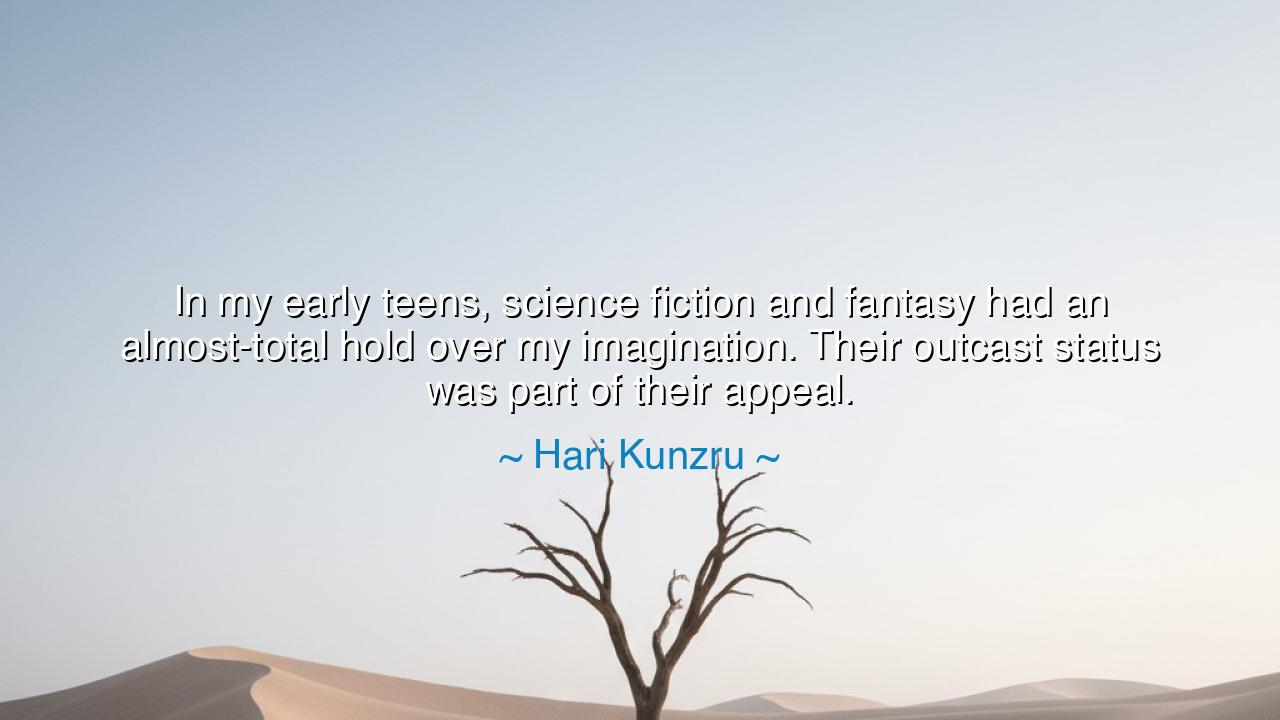
In my early teens, science fiction and fantasy had an
In my early teens, science fiction and fantasy had an almost-total hold over my imagination. Their outcast status was part of their appeal.






“In my early teens, science fiction and fantasy had an almost-total hold over my imagination. Their outcast status was part of their appeal.” — so speaks Hari Kunzru, a writer of vision and depth, whose words remind us of the secret power of stories that dwell at the edge of society’s light. In this reflection lies not only the memory of youth but a profound truth about the imagination, the outcast, and the transformative power of the unseen. He reveals that it was precisely because science fiction and fantasy were neglected and scorned by the serious and the learned that they drew him so completely — for in that realm of exile, the soul finds freedom.
The origin of this quote lies in Kunzru’s own coming of age, in a time when science fiction and fantasy were dismissed by critics as childish amusements or escapist fancies. Yet to the young and the yearning, they were something far more sacred: a portal to other worlds, a mirror for hope, fear, and human potential. For it is often in the outcast arts that imagination thrives — unpolished, untamed, unbound by convention. When society turns its gaze elsewhere, the dreamers build kingdoms in secret. And so, as Kunzru confesses, the very rejection of these genres became their charm. Their “outcast status” was not a mark of shame but of authenticity — proof that they belonged to those who still dared to wonder.
In this, Kunzru touches upon an ancient truth: that the imagination often dwells in exile. In every age, the prophets, poets, and inventors have been misunderstood — their visions mocked, their creations dismissed as folly. Yet from their exile came light. Consider the tale of Mary Shelley, who, at the age of nineteen, wrote Frankenstein — a tale born from science and dream, exploring life, death, and creation itself. Her story, woven in the margins of literature, was once scorned as mere gothic fancy. Yet over time it became a cornerstone of modern thought — the first seed of both science fiction and the ethical imagination of technology. Thus, the outcast became the oracle.
There is something heroic in the imagination that refuses conformity. It is the imagination that looks upon the familiar world and says, “There must be more than this.” The child who reads of distant galaxies, of dragons and civilizations beyond the stars, is not escaping reality — they are learning to see reality anew. The appeal of the outcast lies in this very defiance of limitation. What the mainstream rejects, the visionary redeems. For the outcast art is not broken; it is simply waiting for the world to grow wise enough to understand it.
Kunzru’s confession is not merely nostalgic; it is a testament to how imagination can shape destiny. The stories that seized his youthful mind — of strange worlds, of beings who transcend time and space — taught him to think beyond borders, to question authority, to reimagine what it means to be human. The so-called “lesser genres” gave him the courage to challenge the established order in his own writing. This is the eternal gift of science fiction and fantasy: they teach us to dream of better worlds, and in doing so, they prepare us to build them.
Yet there is a warning here, too. In our modern age, imagination itself is in danger of becoming domesticated — packaged, commodified, and sold, stripped of its rebellious fire. Kunzru’s words call us to remember the creative power of the outsider, the freedom that comes from loving what others neglect. We must keep a part of our imagination wild and unapproved, willing to dwell in those shadowed corners where originality still breathes. For it is there, in the margins, that the next great vision will be born.
So, the lesson of Hari Kunzru’s reflection is clear: cherish your imagination, especially when it leads you where others will not go. Seek the outcast idea, the forbidden story, the strange and the unknown. Let your mind wander into worlds that others fear to dream of. For it is the outcast imagination that keeps humanity alive — reminding us that progress begins in the dreams of those who refuse to belong. And if the world calls your visions foolish, take heart: every new world begins as heresy in the mind of the dreamer, before it becomes truth in the hands of time.






AAdministratorAdministrator
Welcome, honored guests. Please leave a comment, we will respond soon